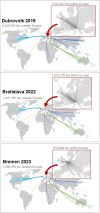A little more conversation, a little more action, please: the carbon footprint of travelling to conferences of the European Health Psychology Society
- PMID: 39777052
- PMCID: PMC11703385
- DOI: 10.1080/21642850.2024.2447454
A little more conversation, a little more action, please: the carbon footprint of travelling to conferences of the European Health Psychology Society
Abstract
Introduction: The environmental impact of on-site conferences, with air travel as the primary contributor to greenhouse gas emissions, has prompted a surge in research in recent years. The objective of this report is to raise awareness and stimulate transformation in the organisation of meetings of the European Health Psychology Society (EHPS).
Methods: We conducted estimations of travel-related CO2eq emissions of EHPS conferences in 2019, 2022, and 2023, and performed projections for 2024 and 2025. Additionally, we developed hypothetical scenarios for selected European cities as centroids for future conferences.
Results: EHPS conferences with an online option result in significant reductions in CO2eq emissions when compared to on-site only conferences. The selected European locations of these conferences enable more delegates to choose alternative forms of transportation instead of flying, such as trains, cars or buses, and consequently lead to significantly lower CO2eq emissions.
Discussion: The principal avenues for curbing travel-related emissions while maintaining on-site attendance are the provision of hybrid conferences with enhanced online participation and the optimisation of venue locations.
Keywords: CO2 equivalent; air travel; flying; greenhouse gas emissions; sustainable mobility.
© 2025 The Author(s). Published by Informa UK Limited, trading as Taylor & Francis Group.
Conflict of interest statement
No potential conflict of interest was reported by the author(s).
Figures



References
-
- Attari, S. Z., Krantz, D. H., & Weber, E. U. (2016). Statements about climate researchers’ carbon footprints affect their credibility and the impact of their advice. Climatic Change, 138(1–2), 325–338. 10.1007/s10584-016-1713-2 - DOI
-
- Atmosfair . (n.d.). Atmosfair: Climate protection with Atmosfair. Retrieved December 28, 2024, from https://www.atmosfair.de/de/
-
- Barron, A. R., Parker, B. J., Sayre, S. S., Weber, S. S., & Weisbord, D. J. (2020). Carbon pricing approaches for climate decisions in U.S. higher education: Proxy carbon prices for deep decarbonization. Elementa: Science of the Anthropocene, 8, 42. 10.1525/elementa.443 - DOI
-
- Bousema, T., Selvaraj, P., Djimde, A. A., Yakar, D., Hagedorn, B., Pratt, A., Barret, D., Whitfield, K., & Cohen, J. M. (2020). Reducing the carbon footprint of academic conferences: The example of the American Society of Tropical Medicine and Hygiene. The American Journal of Tropical Medicine and Hygiene, 103(5), 1758. 10.4269/ajtmh.20-1013 - DOI - PMC - PubMed
-
- Cavallin Toscani, A., Atasu, A., Van Wassenhove, L. N., & Vinelli, A. (2023). Life cycle assessment of in-person, virtual, and hybrid academic conferences: New evidence and perspectives. Journal of Industrial Ecology, 27(6), 1461–1475. 10.1111/jiec.13430 - DOI
LinkOut - more resources
Full Text Sources
